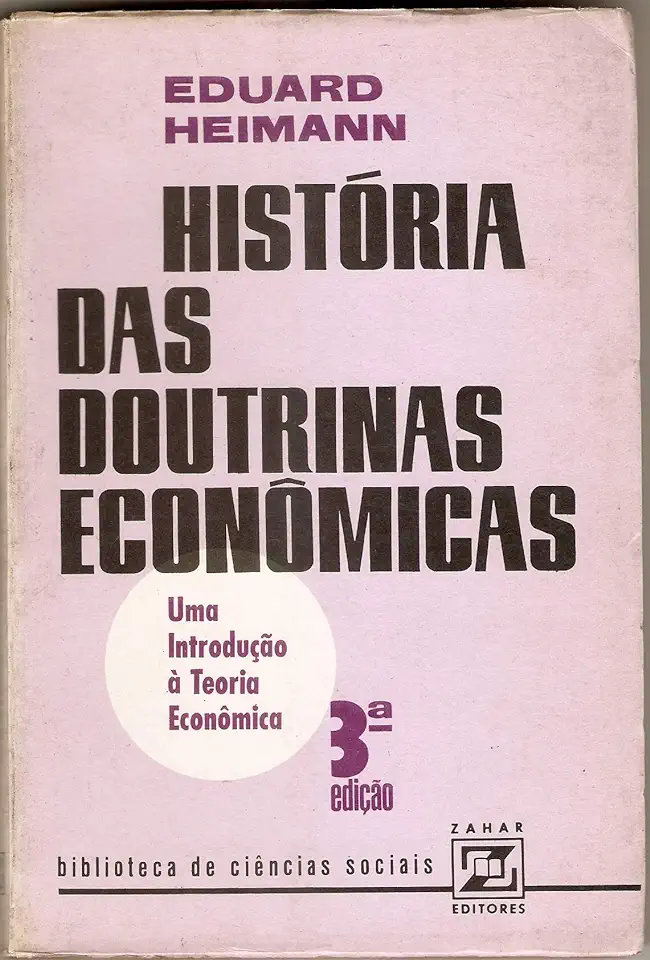
History of Economic Doctrines - Eduard Heimann
History of Economic Doctrines
By Eduard Heimann
A Comprehensive Overview of Economic Thought
In his seminal work, "History of Economic Doctrines," Eduard Heimann presents a comprehensive and engaging exploration of the evolution of economic thought from ancient times to the mid-twentieth century. This magisterial volume offers a profound understanding of the key ideas, theories, and debates that have shaped the field of economics, providing readers with a solid foundation for comprehending the complex economic landscape of today.
Key Features:
Comprehensive Coverage: Heimann's work spans over two thousand years of economic thought, encompassing a vast array of thinkers, schools of thought, and economic systems.
Historical Context: Each economic doctrine is examined within its historical context, allowing readers to appreciate the interplay between economic ideas and the broader social, political, and cultural developments of the time.
Critical Analysis: Heimann provides a critical analysis of each doctrine, highlighting its strengths and weaknesses, and assessing its impact on economic thought and policy.
Engaging Narrative: Written in a clear and engaging style, Heimann's book is accessible to both scholars and general readers alike, making it an ideal resource for anyone interested in the history of economic thought.
Part I: Ancient and Medieval Economic Thought
The book begins with an exploration of economic thought in ancient civilizations, including the contributions of Aristotle, Plato, and the Roman Stoics. Heimann then examines the economic ideas of the Middle Ages, focusing on the influence of the Church and the rise of mercantilism.
Part II: The Mercantilist Era
Part II delves into the mercantilist era, characterized by the dominance of state-controlled economies and the pursuit of wealth through trade and colonization. Heimann analyzes the theories of prominent mercantilist thinkers, such as Thomas Mun and Jean-Baptiste Colbert.
Part III: The Classical School
The third part of the book examines the classical school of economics, which emerged in the late 18th century and emphasized the importance of individual liberty, free markets, and economic growth. Heimann discusses the contributions of Adam Smith, David Ricardo, and Thomas Malthus, among others.
Part IV: Socialist and Marxist Economics
Part IV explores the rise of socialist and Marxist economic thought, which challenged the assumptions of classical economics and advocated for alternative economic systems based on social ownership and equality. Heimann analyzes the theories of Karl Marx, Friedrich Engels, and other socialist thinkers.
Part V: Neoclassical Economics
The fifth part of the book focuses on the development of neoclassical economics, which emerged in the late 19th century and refined the theories of the classical school. Heimann examines the contributions of Alfred Marshall, William Stanley Jevons, and Léon Walras, among others.
Part VI: Keynesian Economics
The final part of the book explores the Keynesian revolution, which transformed economic thought in the mid-20th century. Heimann analyzes the theories of John Maynard Keynes and his followers, highlighting their impact on macroeconomic policy and economic stabilization.
Conclusion
"History of Economic Doctrines" by Eduard Heimann is a monumental work that provides a comprehensive and insightful exploration of the evolution of economic thought. With its engaging narrative, critical analysis, and historical context, this book is an essential resource for anyone seeking to understand the foundations of modern economics. Whether you are a scholar, a student, or simply someone interested in the history of economic thought, this book is a must-read.